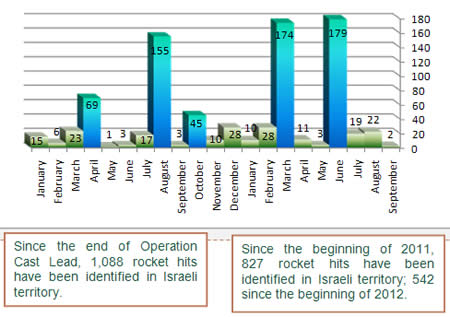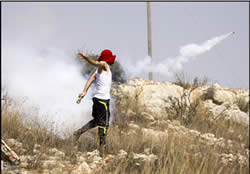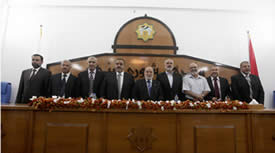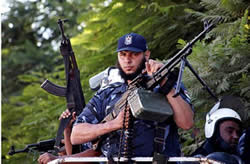- This past week there was an increase in rocket hits targeting the western Negev; 12 hits in all were identified. One of them, a Grad rocket with a range of about 20 kilometers, or almost 12.5 miles, landed near the southern town of Netivot. Another hit the city of Sderot and damaged two residential buildings. Networks in the Gaza Strip affiliated with the global jihad claimed responsibility for most of the rocket attacks. In response Israeli Air Force aircraft struck a number of terrorist targets in the Gaza Strip.
- The de-facto Hamas administration in the Gaza Strip announced a change of faces and appointed a government of 14 ministers, seven of them new. A Hamas delegation headed by Musa Abu Marzouk, deputy chairman of the Hamas Executive Committee, and Ahmed Jaabari, deputy commander of the Hamas military-terrorist wing, went to Egypt to increase security collaboration with Egypt along their joint border.
- The Palestinian Authority is still trying to decide on a date to lodge an appeal with the UN General Assembly to upgrade its status to non-member state.
Rocket Fire Continues
- This past week there was an increase in rocket hits targeting the western Negev; 12 hits in all were identified. Most of them fell in open areas and did not cause casualties or damage, among them were the following:
- On August 31 two rocket hits were identified in the southern city of Sderot. One of them hit two residential buildings. There were no casualties but the buildings were damaged.
- In addition, on September 2 a Grad rocket hit was identified near the town of Netivot; Grad rockets have a range of about 20 kilometers, or almost 12.5 miles. It fell in an open area and did not cause casualties or damage (NRG website, September 2, 2012).
- Responsibility for most of the rocket fire was claimed by networks in the Gaza Strip affiliated with the global jihad (Qudsnews and global jihad forum websites).
- The Palestinians reported that following the increase in rocket fire, Hamas's security apparatuses stepped up their activity against the global jihad-affiliated organizations in the Gaza Strip. Other organizations were warned not to collaborate with them. Global jihad sources expressed surprise that Hamas would prevent rocket fire (Global jihad forum website, September 2, 2012). They also accused Hamas of using the events as an excuse to weaken them (Al-Sharq Al-Awsat, September 1, 2012).
IDF Response to the Rocket Fire from the Gaza Strip
- In response to the rocket fire from the Gaza Strip, Israeli Air Force aircraft struck a number of terrorist targets:
- On September 1 two terrorist sites were struck (IDF Spokesman, September 1, 2012). The Palestinian media reported that two bases were hit, one of them belonging to Hamas. Two Palestinians were injured in the strike (The PIJ's Paltoday website, Safa News Agency and Al-Aqsa TV, September 1, 2012).
- On the night of September 2 IAF aircraft stuck a terrorist site in the Gaza Strip (IDF Spokesman, September 3, 2012). The Palestinian media reported that the target was training ground for Hamas's military-terrorist wing at Al-Nuseirat in the central Gaza Strip. They reported that the base had been damaged but no one had been injured (Safa News Agency and the Izz al-Din al-Qassam Brigades website, September 3, 2012).
Rockets Fired into Israeli Territory[1]

Palestinian Poisoners Detained
- Adnan Otman Nas’arafrom Beit Furiq, near Nablus, and two residents from the village of Tira, near Kfar Saba in the center of Israel, were detained following an Israel Security Agency-Israeli police investigation into the poisoning of a family in Raanana a year ago. The three had been doing work in the family's house. According to the police, they broke into the house and introduced pesticides into bottled drinks in the refrigerator. They were motivated by Palestinian nationalism.
- Nas'ara admitted having committed the crime, which was carried out last October. He claimed that he poisoned the food and drink because he "hated Jews." His two accomplices from Tira were detained on suspicion of involvement in the crime. After family members drank the poisoned soft drink they were hospitalized; the husband spent a week in intensive care (Ynet, September 2, 2012).
Weekly Demonstrations
- This week as well there were riots at the traditional friction points in Judea and Samaria, especially the villages of Nebi Saleh, Bila'in and Nili'in. Rioters threw stones at the IDF forces, who in certain instances used riot control equipment to disperse the demonstrators. In addition, in a number of instances stones and Molotov cocktails were thrown at Israeli civilian and security vehicles.

A Palestinian rioter at Nebi Saleh throws a Molotov cocktail (Wafa News Agency, August 31, 2012).
A Hamas Delegation Goes to Egypt to Discuss Security Collaboration
- A Hamas delegation headed by Musa Abu Marzouk, deputy chairman of Hamas's Executive Committee, and Ahmed Jaabari, deputy commander of Hamas's military-terrorist wing, left the Gaza Strip for Egypt. The visit was part of a Hamas-Egyptian agreement to set up a joint security committee following the investigation of the terrorist attack at Kerem Shalom (Al-Hayat, August 31, 2012).
- Members of the delegation met with senior figures in Egyptian general intelligence and the Egyptian ministry of the interior, as well as with senior figures in the Muslim Brotherhood (Al-Masri Al-Yawm, August 29, 2012). The Palestinian media reported that a plan for joint Palestinian-Egyptian collaboration had been formulated to prevent terrorist attacks in Egyptian territory (Al-Hayat, September 2, 2012).
- According to the Egyptian media, the Hamas delegation promised that the de-facto Hamas administration would step up its security activities along the Egypt-Gaza border and initiate activities to suppress extremist elements which might endanger Egyptian national security (Al-Sharq Al-Awsat, September 2, 2012).
- On their return to the Gaza Strip, Ismail Haniya, head of the de-facto Hamas administration, met with the members of the delegation and asked them to remain in contact with Egyptian security to strengthen their collaboration. He said he admired Egypt for its solidarity with the Palestinian people, particularly with the residents of the Gaza Strip, and that "Gaza has never been and will never be a threat to Egypt's security" (Hamas' palestine-info website, September 1, 2012).
Delivery of Merchandise and Fuel
- Amro Mostafa, deputy chairman of the Egyptian fuel authority, said that Egyptian president Mohamed Morsi had given instructions to have an additional 30 thousand tons of diesel fuel sent to the Gaza Strip to run its power station. That is over and above the fuel donated by Qatar and delivered to the Gaza Strip by Egypt. He said the fuel would be delivered through the Nitzana and Kerem Shalom crossings (Sama News Agency, August 29, 2012).
- Meanwhile, the de-facto Hamas administration is making preparations to establish a free trade zone on the Gaza-Egypt border. The Land Authority of the Hamas administration announced it had completed leveling and preparing an area of 200 dunams, or about five city blocks, which had been allotted by the national economic ministry for the zone (Ma'an News Agency, August 28, 2012). Alaa al-Din al-Rifati, minister of economy in the Hamas administration, said he hoped Egypt would react favorably to the project (The PIJ's Paltoday website, August 30, 2012).
- Interviewed by a correspondent for Al-Watan, Ismail Haniya said that if Egypt opened the Rafah crossing to commercial traffic and if a free trade zone were established, the era of the smuggling tunnels would end (Al-Watan, August 29, 2012).
A Change of Faces in the De-Facto Hamas Administration
- On September 2, after receiving authorization from the Palestinian Legislative Council in the Gaza Strip, Ismail Haniya announced the formation of a new government, which he would head. The government would have 14 ministers, seven of them new faces. A number of ministers would be replaced and new ministries would be established which had either not had formal heads or which had been headed by ministers with more than one post. Most of the new ministers are technocrats who hold senior positions in the Islamic University in the Gaza Strip, considered a Hamas stronghold (Al-Aqsa TV, September 2, 2012).

The Hamas administration's new ministers (Picture from the Al-Risala website, September 4, 2012).
- According to Hamas sources, the change in personnel is not intended to send a political message or influence the internal Palestinian reconciliation process, but rather to "refresh" the ranks.
- For example:
- Salah al-Bardawil, senior Hamas figure, said that the objective of the change was to bring in new blood and rouse government activity to deal with public needs (Ma'an News Agency, September 3, 2012).
- Yousuf Rizqa, Ismail Haniya's political advisor, said that the aim was to solve problems which had so far gone unsolved and to bring new blood into the government. Moreover, he said, some of the former ministers had themselves asked to be replaced (Sama News Agency, September 3, 2012).
- The Palestinian Authority opposed the move, claiming that the administration in the Gaza Strip was not legal and that the change of faces was additional proof that Hamas was widening the gap between the Gaza Strip and the West Bank (Qudsnet website, date, 2012). PA chairman Mahmoud Abbas was particularly critical of Hamas, saying that the objective of the move was political and that the PLO was the only and exclusive political representative of the Palestinian people (Egyptian daily newspaper Ruz Al-Yusuf, September 2, 2012).
The Ministry of the Interior Organizes a Military Display
- The ministry of the interior of the Hamas administration held a military display throughout the Gaza Strip with the participation of its police and security forces. According to the organizers, the objective was to show the forces' preparedness to defend civilians on the home front (Alresalah.net website, September 1, 2012).

Hamas security force operative displays his weapon (Picture from the Filastin al-'Aan website, September 1, 2012).
The Nonaligned Nations Conference in Tehran
- On August 30-31 Mahmoud Abbas participated in the conference of the nonaligned nations in Tehran. He and his advisors exploited the opportunity to put the Palestinian issue on the agenda and to enlist support for the Palestinians' planned move in the UN to upgrade the status of the PA delegation. After the conference Mahmoud Abbas met with Ahmadinejad, and the two discussed various topics related to the Palestinian issue. Mahmoud Abbas declined the Iranian offer to oversee the internal Palestinian reconciliation.
- At the end of the conference the participants expressed support for the Palestinian cause, the legal rights of the Palestinian people, the end of the so-called Israeli "occupation," the establishment of an independent state with Jerusalem as its capital and the so-called "right of return" of the Palestinian refugees. They also noted their support for the steps taken by the Palestinian Authority to upgrade its status in the UN, and even called on their various UN representatives to support the Palestinians in their effort. In addition, they called for the immediate release of the Palestinians terrorists imprisoned in Israeli jails (Qudsnet website, September 2, 2012).

Mahmoud Abbas at the meeting of the nonaligned nations in Tehran (Picture from the Wafa News Agency website, August 30, 2012).
The Palestinian Authority Appeal to the UN General Assembly
- The Palestinian Authority has still not decided exactly when it will lodge its appeal with the UN General Assembly to upgrade its status from observerto non-member state, although the move is planned for September 2012. Palestinian sources reported that because of the situation in the Arab world, the events in Syria, the American presidential election and the efforts of the United States to renew negotiations between Israel and the Palestinians, at this point the appeal would be temporarily shelved (Qudsnet website, August 30, 2012).
- Senior figures in the Palestinian Authority had the following to say about the appeal to the UN:
- Nabil Abu Rudeina, spokesman for the president's office, said that the date would be set only after the meeting of the Arab League's monitoring committee in Cairo on September 5-6 (Agence France-Presse, August 30, 2012).
- Riyadh al-Maliki, PA foreign secretary, said that the PA would postpone the appeal until a later date. He said that on September 27 Mahmoud Abbas would give a speech in the UN General Assembly where he would stress his determination to promote the step and would even demand that the PA representative to the UN begin contacts to achieve the majority vote the Palestinians needed (Qudsnet website, August 30, 2012).
- Tawfiq al-Tirawi, a member of Fatah's Central Committee, criticized al-Maliki's remarks, claiming he did not have the authority to express an opinion regarding the date. He said that al-Maliki's remarks had harmed the Palestinian leadership and credibility in the eyes of the Palestinians, and was similar to the demands made by the United States and Israel (Ma'an News Agency, September 1, 2012). Following al-Tirawi's criticism, al-Maliki rushed to deny having made the statements attributed to him.
Welcome to Palestine 3 Activists Hold Protest in Jordan
- After having been refused entry to Israel, Welcome to Palestine 3 activists held a rally in front of the French embassy in Amman to protest and called on the French government to exert its influence with Israel. There was also a protest rally in front of the Israeli embassy in Amman. Jordanian security forces requested that the demonstrators not approach the Israeli embassy. Some of them refused to comply, and seven were detained and released a short time later (Welcome to Palestine 3 blog, August 30 2012).
- Note: On August 26 an estimated 100 Welcome to Palestine 3 activists attempted to enter Judea and Samaria through the Allenby crossing in Jordan, but were refused entry by Israel.
[1]As of September 4, 2012.












